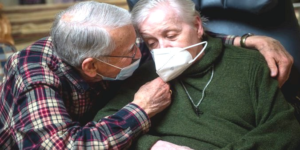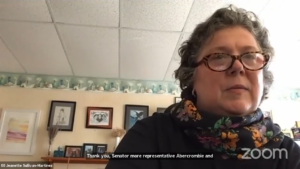So far, 23 states have passed more than 70 new pandemic-related provisions affecting nursing home operations.
By Susan Jaffe | KAISER HEALTH NEWS | August 17, 2021 | This story also ran in![]()
When the coronavirus hit Martha Leland’s Connecticut nursing home last year, she and dozens of other residents contracted the disease while the facility was on lockdown. Twenty-eight residents died, including her roommate.
“The impact of not having friends and family come in and see us for a year was totally devastating,” she said. “And then, the staff all bound up with the masks and the shields on, that too was very difficult to accept.” She summed up the experience in one word: “scary.”
But under a law Connecticut enacted in June, nursing home residents will be able to designate an “essential support person” who can help

take care of a loved one even during a public health emergency. Connecticut legislators also approved laws this year giving nursing home residents free internet access and digital devices for virtual visits and allowing video cameras in their rooms so family or friends can monitor their care.
Similar benefits are not required by the Centers for Medicare & Medicaid Services, the federal agency that oversees nursing homes and pays for most of the care they provide. But states can impose additional requirements when those federal rules are insufficient or don’t exist. And that’s exactly what many are doing, spurred by the virus that hit the frail elderly hardest. [Continued at Kaiser Health News and USA Today]
 Volume 398, Issue 10300
Volume 398, Issue 10300



 rgeries so risky for older adults that that the insurance program
rgeries so risky for older adults that that the insurance program 